With the new post-war Fords were coming out in 1949, several traditions were ending with 1948. They would be the last to be built during Henry Ford’s lifetime, they would be the last U.S. go-round of the flathead engine, they would be the last time you could crank one with the lug wrench inserted through the grill, and they would be the last of the “Woodies.” The seller has one of these woodies, a 1948 Ford Super Deluxe, a wagon he’s owned for nearly 50 years. It’s located in Loma Linda, California (east of L.A.) and available here on craigslist for $18,000 OBO. Thanks, Pat L., for finding this one for us!
Like its competitors, Ford wasn’t making automobiles during World War II. So, when the war ended, their models were mostly redressed pre-war cars for ‘47 and ‘48. New designs wouldn’t be ready until 1949. These holdovers included the steel/wood wagons, aka woodies, assembled at Ford’s Iron Mountain plant. This was because Ford sourced their wood from their own forests in Northern Michigan and they also milled the wood and built the bodies there.
The seller has owned this 1948 Super Deluxe Woodie since the early 1970s. He made several trips throughout the West and Northwest before parking it about 25 years ago. Parts of the car look surprisingly good, including some wood, in many areas. In others, not so good. These wood-based wagons can be expensive to repair and that may be the case here as there is a lot of rotted timber on the roof and by the driver’s entrance. The passenger side front door is off the wagon and it looks as though it served as lunch or dinner for a family of termites – several times over.
We’re told the engine is a late model flathead, which suggests it’s not the original engine. But exactly what it is and what it will take to get the wagon running again is unknown. The interior is fair in many respects, but there appears to be a couple of small rust holes in the driver floorboard. The wagon has all three of its seats, but one of them is down to the metal wire frame. The seller says he has additional photos on Dropbox which you may want to check out because they show the wood damage that the eBay uploaded photos don’t.
Hagerty says these rare wagons can easily bring $40-50,000, but this one has a long way to go to get to that level. Whatever you think the cost of repairing/replacing the wood will cost, double it. If you were to consider this one to be in fair condition, $10,000 might be right. So, the seller seems to be optimistic regarding his rare wagon.
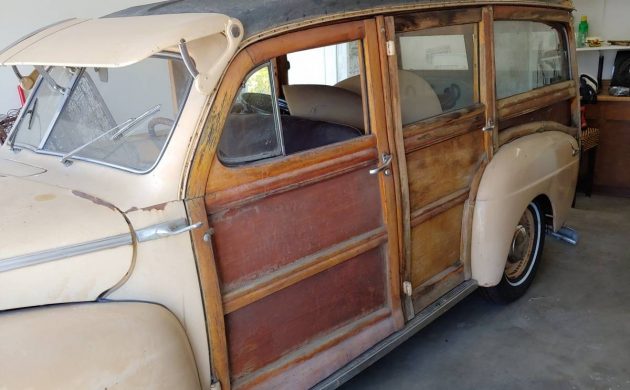
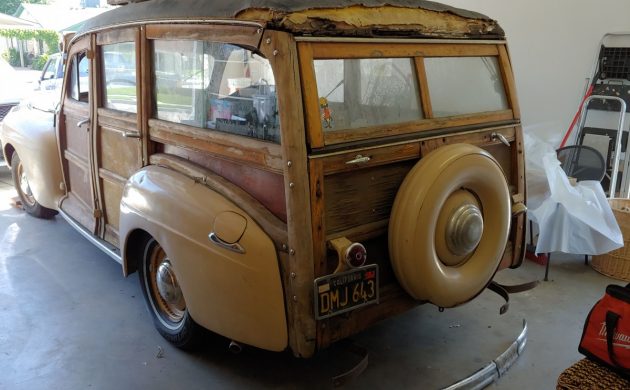
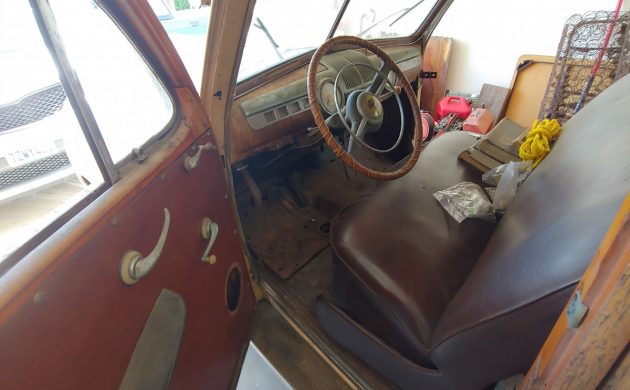
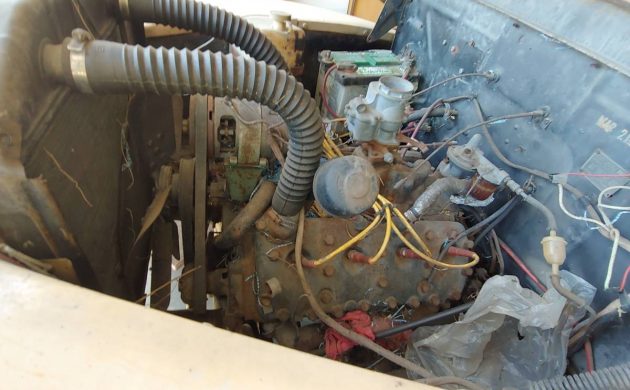
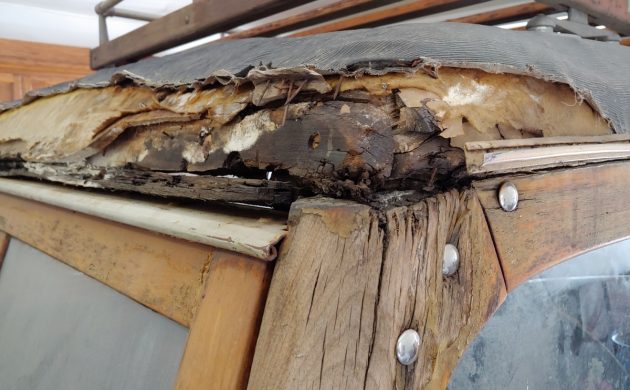





I’m a little confused, Russ. How could the ’48 Fords be the “last go-round of the flathead engine” when the last flatties were built in 1953?
Other than that, good stuff, though I’m thinking that $18K price will be just the tip of the financial iceberg. Assuming there is no rusty metal, the woodwork alone will will cost a packet, unless the new owner is a skilled carpenter or has a close friend who is. The mechanicals should be pretty straightforward, anyway.
I wouldn’t try, if only because I don’t have the skills to replace/refinish the timber. I hope some sympathetic individual does; these are pretty thin on the ground, and I remember seeing plenty that had been hot-rodded (the word “restomod” had yet to be coined) back in the ’60s and ’70s.
I usually check 2 or 3 online sources for each article, especially with cars that were made before me. I paraphrased that comment from one of those. I guess everything you read on the internet isn’t true after all!
The owner is a friend of mine. Word to the wise: this is a Fiero based kit car.
Yeah, right!
shouldn’t that be ” yeah , right Mate ! ” lol
I don’t think 48 was the last year for a Ford Woodie. I believe they were built until 51.
’48 was the last of the Wooden body Wagons, in 49-51 they went to a Steel underbody and roof with the wood panels on the sides as the outer surface. the 49-51 were also two doors not four.
In the movie “a summer place” there’s an oh-so-cool 51 ford woodie, maybe that helps. Sandra Dee was pretty cool too…..
Cheers and stay safe
GPC
Just like water and oxygen are bad for metal and cause rust the same can be said for wood that is exposed to water and not sealed from it’s long term effects on “dead wood” (aka wood no longer part of a living tree) and like rust the wood rot often never stoops until it is cut out. Looks like that has sadly had an effect on this Woodie over the decades. It will take a brave or deep pocketed person to revive this Woodie and hopefully so as there were only so many made and only so many that survived.
I’m guessing a minimum 20K in labor and material. Could just as easily be 30.
There aren’t a bunch of people with the proper sized steam cabinet and carpentry savvy with experience on something like this.
Though I drool, I know I’ll never have the bread for something like this unless my Powerball numbers hit.
Most wood “kits” for this year car run from 25 to 30K
I agree with most of the comments. This Woody would be a great candidate for restoration, and the price seems reasonable, if you are remembering that the prices of these car a few years ago ,were much higher. That’s the good news, the bad news the price of restoration, has gone up, so nothing has changed, great car, but still expensive to restore and own.
My buddy restores old worries, he is now 82 years old, and here’s the big problem with Woody wagons: they can’t sit outside for any period of time, as sunlight causes the wood to fall apart. So basically you have a garage queen after you finish it. This car is a total wreck, and you can spend up to $100,000 getting it to look nice. As the saying goes, it’s better to spend the extra money, and buy a vehicle that has already been restored